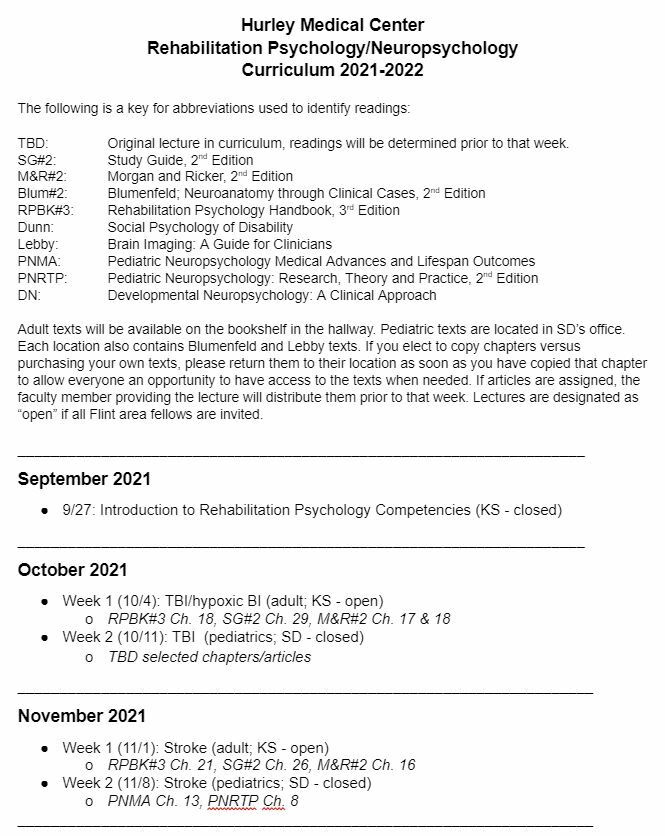Curriculum
Clinical Activities & Supervision
The clinical environment at Hurley Medical Center provides for advanced learning experiences for those specializing in adult rehabilitation psychology. As a Level 1 Trauma Center and a Children's Hospital, Hurley provides a wide case mix for learning. First-year fellows typically have 15-25 hours of patient contact per week, providing targeted assessments, interventions, and real-world practice. In many circumstances, fellows - with input from their supervisors - can select cases that will best enhance their knowledge base, providing a wide-ranging learning experience. Fellows learn evidence-based practice and how to develop and monitor appropriate treatment plans.
Main clinical activities include:
- Inpatient consultations
- Psychological Testing
- Outpatient Neuropsychological and Cognitive Testing
- Individual Supervision
- Patient-Care Rounds

Adult Rehabilitation Psychology Curriculum Summary
Blend of experience, wide spectrum of patients
For fellows in adult rehabilitation psychology, main clinical activities include:
- Inpatient consultations
- Typically requires the fellow to: respond within 24 hours of request, evaluate patient at bedside, write notes as required by Hurley standards, formally communicate with the referring physician.
- Psychological Testing
- Conduct psychological, neuropsychological, and cognitive assessments. May include determining necessity/appropriateness of testing for a given patient, with guidance from supervisors.
- Outpatient Neuropsychological and Cognitive Testing
- A fellow usually completes 20-30 outpatient evaluations during the first year and 30-45 evaluations during the second year. Completion of at least 50 outpatient evaluations is normally required to graduate in good standing from the Rehabilitation Psychology Fellowship. First-year fellows typically see one outpatient neuropsychology testing case every other week. Fellows are expected to complete their report within 1 week of the assessment and have 5 days to revise (per supervisor’s feedback), if needed.
- Many clinical activities include one-on-one teaching/supervision from the supervisor. For example:
- Individual Supervision
- Fellows have a least two hours of individual, face-to-face supervision each week, plus two or more supervisors during any one training year. Supervision occurs in multiple settings, such as during rounds, on the floor during patient-care activities, via phone, email, text-messaging, outpatient office, and other contexts.
- Patient-Care Rounds
- The fellow participates weekly in patient-care rounds with hospital-based psychologists, exposing the fellow to patient-care coordination and discussions about clinical issues with deep educational value. Supervisors often conduct group discussions on educational topics that arise during clinical care.
Didactic Training
The fellowship provides a robust rehabilitation psychology curriculum, along with many elective seminars and activities to deepen knowledge and skills, while preparing fellows for a long and successful career in rehabilitation psychology.

- Weekly rehabilitation health psychology seminars*
- Professional development, leadership, and management seminars*
- Adult medical seminars (e.g., noon conferences, grand rounds; morbidity, mortality and improvement; tumor board)*
- Graduate Medical Education Combined Lectures (e.g., professionalism, wellness, cultural sensitivity, corporate compliance, confidentiality, risk management, health disparities, population health, quality and patient safety)*
- Trauma conference
- Psychopharmacology
- Hospital-wide committee participation (e.g., ethics committee)
- Book chapter review and journal club
*Required educational experiences
Sharing your knowledge
Scholarly Activities
The program provides a scholarly approach to rehabilitation psychology practice and provides a robust educational curriculum.
1 scholarly project required during the entire fellowship period
Support:
- On-site 24/7 medical library
- Dedicated research department
- Faculty support mentorship
Types of scholarly activities available:
- Collaborative research studies
- Quality improvement projects
- Program evaluation
- Participation and eventual authorship of peer-reviewed works including posters, oral presentations, and journal articles
Teaching activitites
Medical education is a minor emphasis of the fellowship.
- Teaching, instruction, and shadowing for medical residents and medical students
- Formal didactic instruction to peers, medical residents and medical students on topics related to rehabilitation psychology, psychological testing, and neuropsychological and cognitive testing
- Community outreach
- Supervision of practicum students
- Curriculum development
- Eligible for faculty appointment from Michigan State University College of Human Medicine
